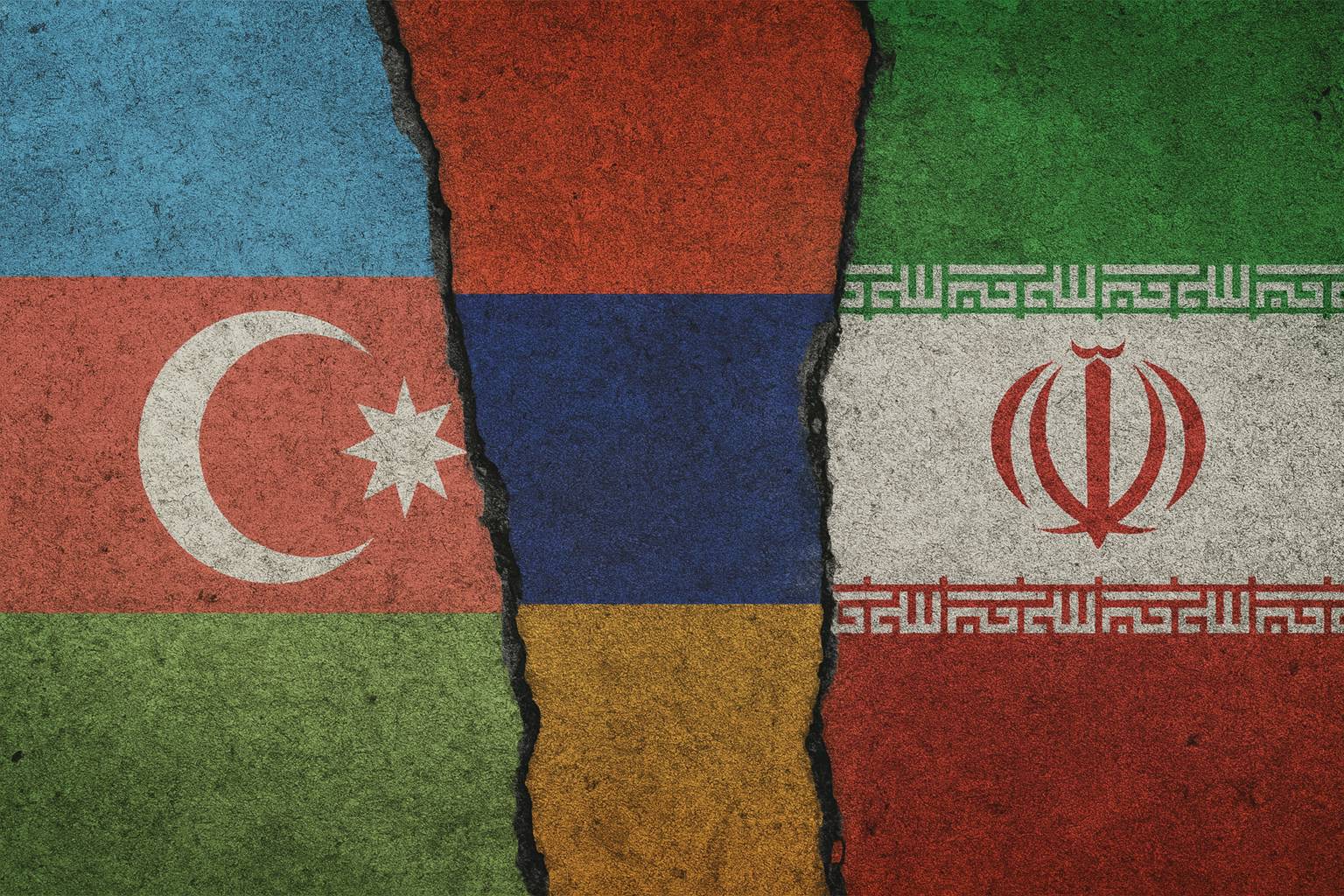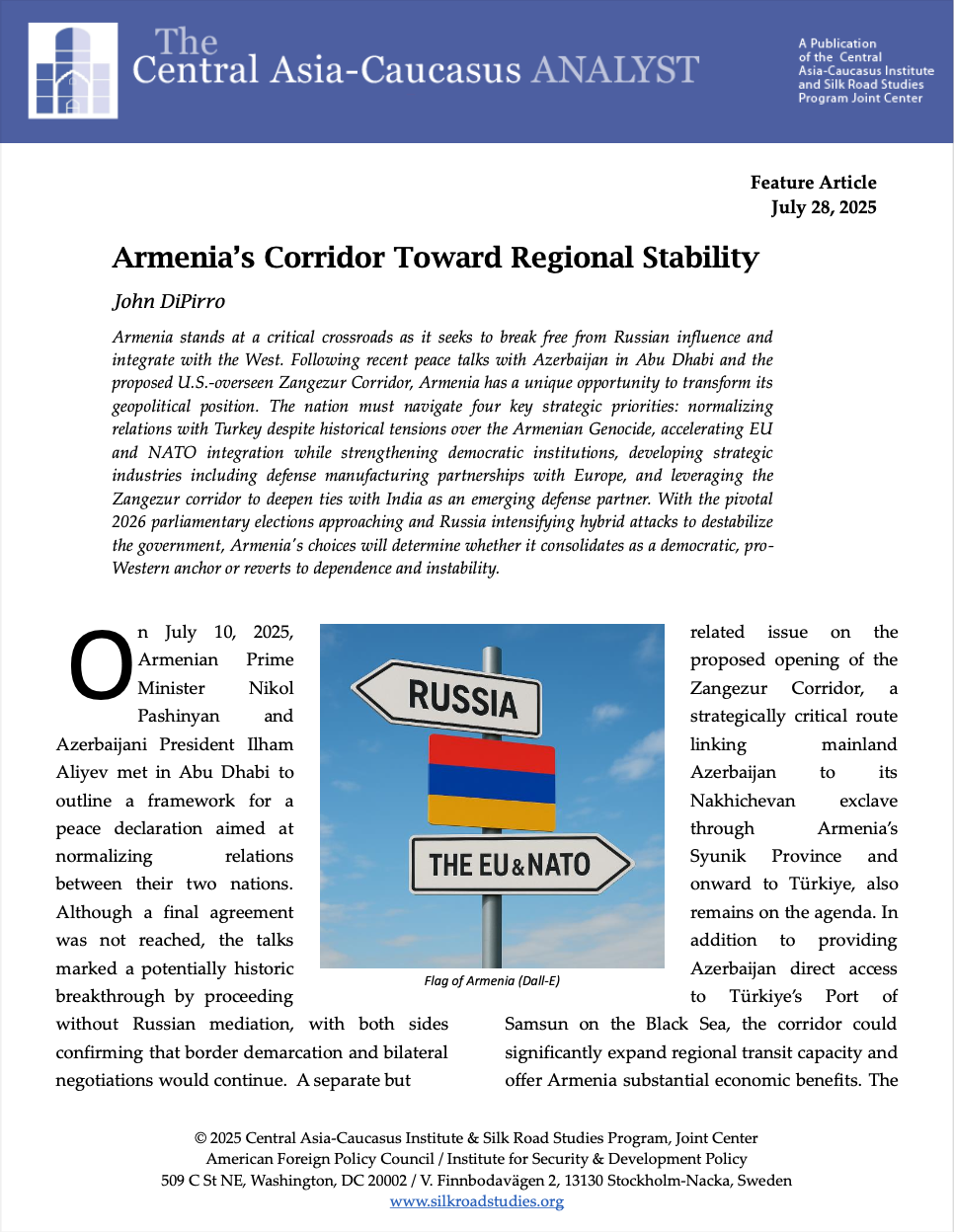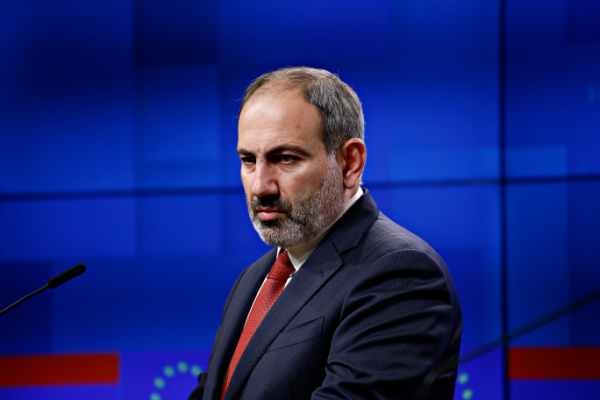Armenia-Azerbaijan Peace: What is Iran Really Afraid of?
By Mehmet Fatih Oztarsu
The U.S.-brokered peace talks between Armenia and Azerbaijan, culminating in the creation of the Trump Route for International Peace and Prosperity (TRIPP), have triggered a sharp strategic reaction from Iran. The 20-mile corridor through Zangezur grants Azerbaijan direct access to Nakhchivan under long-term U.S. management, reshaping regional connectivity and bypassing Iran. Tehran perceives the initiative as a U.S. encroachment on its northern frontier, eroding its leverage in the South Caucasus. The muted Russian response and Armenia’s growing openness to Western—and potentially Israeli—security ties deepen Iran’s unease, fueling fears of encirclement and diminishing its role as a key regional transit hub.

BACKGROUND: Brokered by the U.S., the latest Armenia–Azerbaijan peace talks have quietly but decisively reshaped the balance of power in the South Caucasus. At the heart of the deal is a newly designated transit Zangezur Corridor, officially named the Trump Route for International Peace and Prosperity (TRIPP), which would grant Azerbaijan direct access to its Nakhchivan exclave through southern Armenian territory. Moscow has responded with unusual silence, while Tehran has openly bristled at the emergence of a U.S.-designed transit network on its northern frontier.
Iran’s initial reaction to the U.S.-brokered Armenia–Azerbaijan peace framework has been visceral, with some prominent media organs terming it a “betrayal”. Tehran explicitly sees TRIPP as a U.S. footprint pressed onto its northern frontier. The plan envisions a 20-mile corridor through Armenia’s Syunik region, linking Azerbaijan to its Nakhchivan exclave, with development rights leased to a U.S. consortium for up to 99 years. More than redrawing borders, the project reshapes the balance of power and places a sustained U.S. commercial and political presence in the narrow strip where Iran has long turned geography into strategic leverage.
IMPLICATIONS: Iran interprets the recent Azerbaijan–Armenia peace talks not only as a potential shift in the regional balance of power but also as part of a broader geopolitical environment increasingly hostile to its interests. Tehran worries that a settlement, especially one facilitated or backed by Western actors (including Turkey), could strengthen Azerbaijan’s position, deepen Baku’s security and economic ties with the West and Israel, and reduce Iran’s leverage in the South Caucasus. These concerns are amplified by the expanding footprint of the U.S. and Israel in Azerbaijan, from intelligence cooperation to defense technology transfers, which Tehran perceives as part of a containment strategy aimed at its northern flank. Against this backdrop, any peace process that sidelines Iran or solidifies the U.S. influence in the region risks, in Tehran’s view, to tighten the strategic noose around its borders.
Iran’s historical memory of regional threats plays a significant role in shaping its foreign policy reflexes. In addition to the growing perception of U.S. and Israeli threats following the 1979 Islamic Revolution, the Soviet invasion of Afghanistan further heightened Tehran’s sense of vulnerability. Iranian officials, suspecting that the Soviets might use the Baloch as a stepping stone toward making Iran their next target, began seeking countermeasures. After the Soviet collapse, the country continued to frame its foreign policy around an intensifying rhetoric of U.S. and Israeli danger and the cooperation of Azerbaijan with these powers. Today, Washington’s renewed bid to reassert influence in the region is likely to aggravate Iran’s geopolitical anxieties, with indirect repercussions visible in Iran–Azerbaijan relations.
Tehran’s messaging, while varied in tone, consistently reflects unease about the deal. Ali Akbar Velayati, senior adviser to the Supreme Leader, warned that the corridor would become a “graveyard” for its backers; a classic piece of deterrent rhetoric aimed at raising costs and sowing doubt. At the same time, the Foreign Ministry expressed conditional support for a peace deal in principle, while cautioning against “foreign interference” near Iran’s borders. President Masoud Pezeshkian said that Iran’s core demand had been met, yet voicing unease over U.S. corporate involvement.
Tehran is not worried about lines on a map. It is losing the bargaining power that those lines used to confer. A corridor under Armenian law deprives Iran of the sovereignty argument it used against an “extraterritorial” Zangezur model, outside Armenian jurisdiction. However, U.S. stewardship narrows Iran’s room to shape rules, customs, and security practices at the edge of its border. A U.S.-organized logistics spine running from Turkey via Nakhchivan to Azerbaijan (tightening connectivity between Turkey and Central Asia) offers a shorter, more secure east–west route that bypasses both Russia and Iran.
The Russian reaction intensifies Iran’s dilemma. Moscow’s muted response by accepting a U.S. role while cautioning against “foreign meddling” signals that Russia, overstretched and weakened in credibility after the 2020 Second Karabakh War, lacks the capacity or will to reshape the deal. For Tehran, this translates into fewer veto options by proxy and a thinner buffer against Turkish and U.S. coordination. It also incentivizes Yerevan to deepen ties with Western partners, which is not acceptable for Tehran.
Economically, the corridor undermines Iran’s claim to constitute an indispensable regional bridge. Tehran has long positioned itself as the key link between the Persian Gulf, the Caucasus and the Black Sea, with initiatives like the International North–South Transport Corridor and electricity and gas swaps with Armenia designed to cement that role. A functioning TRIPP route diverts attention and investment toward the “Middle Corridor,” lowering the premium shippers pay for transit through Iran and shrinking Tehran’s leverage to extract side deals on access, security assurances or energy flexibility. Iran’s alternative options remain limited, as seen in its cautious approach to the Gulf of Hormuz closure in June 2025.
Security risks run in both directions. For Tehran, a U.S.-supervised logistics corridor along its northern frontier would invite surveillance and restrict its gray-zone tactics. Yet overt interference such as through intimidation, sabotage, or proxy harassment would likely backfire. Such moves could strengthen U.S.–Turkish coordination (and even Azerbaijani-Israeli coordination), justify reinforced security around the route and push Armenia toward even closer alignment with Washington and Brussels. Iran’s own experience shows that coercion is most effective when opponents lack a unifying patron; TRIPP provides precisely that.
Still, Tehran has a few levers left. The first is regulatory: it can push for “no military use” clauses, real-time customs transparency and verified policing regimes that limit the route’s securitization. The second is connectivity hedging. The new route builds upon Iran’s already existing north–south connections with Armenia, including the Meghri–Julfa railway link, expanded electricity exchanges, and predictable gas swaps. Thus, the U.S.-managed corridor supports, rather than replaces, Iranian routes. The third is political triangulation. Iran maintains open channels with Ankara on trade and energy, where their interests sometimes overlap, while giving Yerevan price and reliability benefits that only a neighboring country can offer.
CONCLUSIONS: Then, what is the balance sheet? In the short term, Iran faces a strategic setback in shaping the regional agenda. The U.S. has demonstrated its ability to achieve outcomes in the South Caucasus that Moscow could not, and the corridor effectively puts a purely Western hand on the flow of regional connectivity (the role of Turkey is also extremely important). In the medium term, Tehran can still limit the impact by quickly upgrading its own corridors, offering competitive transit pricing, and securing Indian and Gulf participation in north–south routes, turning competition into redundancy rather than outright replacement. Over the long term, the key question is whether Iran can tolerate a U.S. presence next door while extracting enough rules and linkages to avoid strategic encirclement.
An additional factor complicates this calculus: the possibility of an Israel–Armenia security partnership. While historically limited, such a relationship becomes more logical in a post-peace-deal environment where Yerevan seeks diversified defense ties beyond Russia and the West. This possibility is already being discussed in various circles. Israeli defense technology, already embedded in Azerbaijan, could find a foothold in Armenia in the form of counter-drone systems, border surveillance or intelligence sharing, especially if framed as balancing Ankara–Baku military cooperation. For Tehran, this would imply Israeli-linked security infrastructure on both its northwestern and northern flanks, eroding any remaining buffer zones and deepening the perception of encirclement. In such a scenario, even an economically beneficial TRIPP corridor would be overshadowed by the strategic risks it amplifies.
AUTHOR'S BIO: Dr. Mehmet Fatih Oztarsu is Assistant Professor at Joongbu University and Senior Researcher at the Institute of EU Studies at Hankuk University of Foreign Studies. He studied and worked in Baku, Yerevan, Tbilisi, and Seoul as an academic and journalist. He is the author of numerous articles and books on South Caucasus and Central Asian affairs. Additionally, he is a member of the Young Turkey–Young America fellowship program at the Atlantic Council and the Korean Society of Contemporary European Studies.
Armenia’s Corridor Toward Regional Stability
John DiPirro
July 25, 2025
Armenia stands at a critical crossroads as it seeks to break free from Russian influence and integrate with the West. Following recent peace talks with Azerbaijan in Abu Dhabi and the proposed U.S.-overseen Zangezur Corridor, Armenia has a unique opportunity to transform its geopolitical position. The nation must navigate four key strategic priorities: normalizing relations with Turkey despite historical tensions over the Armenian Genocide, accelerating EU and NATO integration while strengthening democratic institutions, developing strategic industries including defense manufacturing partnerships with Europe, and leveraging the Zangezur corridor to deepen ties with India as an emerging defense partner. With the pivotal 2026 parliamentary elections approaching and Russia intensifying hybrid attacks to destabilize the government, Armenia's choices will determine whether it consolidates as a democratic, pro-Western anchor or reverts to dependence and instability.
Read Armenia's Corridor Toward Regional Stability

Armenia and Azerbaijan Reshape their Future through Direct Negotiation
By Robert M. Cutler
The year 2024 saw a shift away from external mediation in the Armenia–Azerbaijan conflict, to direct bilateral negotiations. Despite widespread expectations of a finalized peace treaty by the end of 2024, no agreement was signed. This reflects a strategic decision to avoid an interim settlement that could entrench unresolved provisions. Constitutional ambiguities in Armenia and bilateral territorial adjustments continue to shape the negotiation dynamics, raising questions about whether this diplomatic model will consolidate into a stable framework or remain in flux.

BACKGROUND: Since the 1994 Bishkek Protocol froze the conflict between Azerbaijan and Armenia over Nagorno-Karabakh in a fragile ceasefire regime under Russian sponsorship, mediation models had consistently prioritized multilateral equilibrium over durable resolution. The OSCE Minsk Group—formalized in December 1994 with the three co-chairs France, Russia, and the U.S.—institutionalized this status quo. In this diplomatic environment, negotiations served as an instrument for conflict management rather than conflict termination. The April 2016 Four-Day War briefly upended that architecture, demonstrating the latent instability embedded of the frozen-conflict model. Four and a half years later, the 2020 Second Karabakh War fundamentally restructured the region’s power balance. It rendered obsolete the externally imposed frameworks that had governed negotiations since the collapse of the Soviet Union.
The outcome of the 2020 war was the restoration of Azerbaijan’s control over the previously Armenian-occupied regions around the territory of the former (Soviet-era) Nagorno-Karabakh Autonomous Oblast. The Russian-brokered ceasefire of November 10, 2020, set the stage for a negotiation dynamic predicated on asymmetrical positioning. Armenia’s formal recognition of Azerbaijan’s territorial integrity in October 2022 (a move reportedly taken despite Kremlin opposition) implicitly signalled a shift that was not widely acknowledged at the time. Specifically, multilateral mediation lost its functional rationale; a new phase of direct engagement emerged. The replacement of Minsk Group arbitration, beginning with face-to-face negotiations in Brussels (May 2022), Prague (October 2022), and Munich (February 2023), was the logical conclusion of this trajectory.
The October 2022 Prague meeting marked the first sustained round of direct talks without the Minsk Group’s mediation. It encapsulated the recalibration of the regional conflict-resolution paradigm. The Armenia–Azerbaijan peace process has entered a structurally distinct phase, as direct bilateral diplomacy has replaced externally mediated negotiations. This is not merely a procedural transition. It is a fundamental shift in the conflict’s geopolitical management. For nearly three decades, external actors—principally Russia, the U.S., and the EU—had dictated the diplomatic framework while regional players remained constrained by inherited institutional architectures, notably the defunct OSCE Minsk Group.
IMPLICATIONS: The failure to finalize a peace treaty in 2024, despite reports that 90 percent of the agreement had been drafted, is not due to any diplomatic shortcoming. Rather, it represents a strategic recalibration. The logic behind avoiding an interim settlement is evident in historical analogues. For example, while the 1995 Dayton Accords successfully concluded the Bosnian War, institutionalized ethnic partitions persist as a structural impediment to governance nearly three decades later. To take another example, the 2015 Minsk II Agreement, designed to create a transitional settlement for the then-Donbas conflict, wound up embedding unresolved territorial issues in the political fabric. This subsequently facilitated Russia’s full-scale invasion of Ukraine in February 2022.
The deliberate avoidance of a prematurely finalized Armenia–Azerbaijan treaty suggests an awareness of these precedents. By declining to entrench provisions that might later serve as triggers of an unresolved structural conflict, the diplomatic system moves toward a “stable equilibrium” to replace the “local equilibrium” of the temporary cessation of hostilities. The elimination of substantive third-party mediation reinforces this shift.
Since October 2022, all consequential negotiations have been conducted bilaterally. External actors now function as logistical facilitators rather than as substantive arbiters. This pattern is comparable with, for example, the 1979 Egypt–Israel Peace Treaty, which—despite U.S. facilitation at Camp David—was fundamentally structured around direct negotiation and which has shown durability for over four decades. It contrasts with the 1993 Oslo Accords, which relied upon external assurances and ambiguous transitional mechanisms, and which collapsed amid shifting geopolitical realities. The Armenia–Azerbaijan framework thus increasingly resembles the former model, with bilateralization reinforcing sustainability. However, asymmetries within the process remain pronounced.
Azerbaijan has consistently employed a “position-setting” strategy, articulating clear demands and advancing specific legal-political objectives. This was evident in President Ilham Aliyev’s remarks at the February 2024 Munich Security Conference, where he characterized the negotiation process as a “one-sided dialogue” in which Azerbaijan proposes terms while Armenia refrains from active counter-positioning. This dynamic was illustrated also by the February 2024 withdrawal of Armenian forces from four Azerbaijani villages (Baghanis-Ayrum, Ashaghi Askipara, Kheyrimli, and Gizilhajili). This withdrawal was executed without a formalized reciprocal agreement, creating the perception that Azerbaijani proposals, rather than structured bilateral compromise, are the driving force in the conflict-resolution process.
The trial of Ruben Vardanyan, a key former figure in the Karabakh administration, further underscores Azerbaijan’s strategy of consolidating its post-2020 advantage through legal and political mechanisms. Vardanyan, arrested in September 2023 following Azerbaijan’s military operation in Karabakh, has been charged with financing terrorism and illegally crossing Azerbaijan’s border. His prosecution reflects a broader pattern of post-conflict legal adjudication, where Azerbaijan is systematically dismantling the institutional remnants of the former Karabakh authority while reinforcing its sovereignty claims over the region.
This judicial dimension introduces new considerations for the negotiation process. While Armenia has distanced itself from former Karabakh leadership figures, the trial raises concerns over how legal precedents set by Azerbaijan’s courts could influence broader diplomatic calculations. Precedents from post-war trials in Bosnia and Kosovo demonstrate that such cases can serve as mechanisms of conflict closure or as sources of prolonged diplomatic friction, depending on how they are leveraged within ongoing negotiations. Whether the trial is seen as a necessary legal process or as a strategic assertion of power will shape both Armenian domestic discourse and international perceptions of Azerbaijan’s post-war governance model.
An unresolved question about Armenia’s constitution remains a central point of contention. The constitution’s preamble makes reference to the 1990 Armenian Declaration of Independence, which in turn invokes the 1989 Soviet-era decision on the then–Nagorno-Karabakh, implicitly sustaining a legal framework that conflicts with Armenia’s 2022 diplomatic commitments. While Armenia contends that a treaty provision will supersede domestic law, Azerbaijan cites historical precedents in which Armenian legal rulings activated dormant constitutional clauses to justify policy reversals.
For example, the 2003 Armenian Supreme Court decision permitting Robert Kocharyan’s candidacy for president, despite constitutional residency requirements, exemplifies this phenomenon. Kocharyan, who had never officially resided in the Republic of Armenia prior to independence, was deemed eligible based on his prior residence in Nagorno-Karabakh during the Soviet and early post-Soviet period. This precedent reinforces Azerbaijan’s concerns regarding the durability of Armenian legal commitments, particularly given the requirement for a national referendum to amend the constitutional preamble—an event that will not take place before late 2026.
Historically, such delays have introduced windows of instability, where unforeseen political shifts disrupt anticipated diplomatic trajectories. The postponement of Palestinian legislative elections following the Oslo Accords, for example, contributed to the erosion of transitional governance structures, leading to subsequent escalations. The Armenia–Azerbaijan process now faces a comparable timeline-dependent risk, where protracted legal ambiguity could generate new friction points before formalized resolution mechanisms are enacted.
CONCLUSIONS: The bilateralization of diplomacy in the South Caucasus challenges the post-Soviet convention of externally managed equilibrium but has not yet cohered into a stable system. Whether the region consolidates into a sustainable post-conflict order or re-enters a phase of mediated arbitration depends not only on the resolution of uncertainties over the Armenian constitution, but also on unresolved territorial demarcations and the strategic recalibrations of external actors. The next 24 months will likely determine the trajectory of this diplomatic framework. Events between now and the end of 2026 will establish whether bilateral statecraft becomes institutionalized or whether it remains only an intermediary phase before external actors (not just Russia but also the EU and Iran) again seek to reassert dominant influence.
AUTHOR BIO: Robert M. Cutler was for many years a senior research fellow at the Institute of European, Russian and Eurasian Studies, Carleton University, and is a past fellow of the Canadian International Council.
Pashinyan Between Armenia and Azerbaijan: The Curse of Radical Changes
By Mehmet Fatih Oztarsu
February 27, 2024
Armenian Prime Minister Nikol Pashinyan seeks a new path forward following Azerbaijan’s seizure of Nagorno-Karabakh and the radical shift in regional dynamics in the South Caucasus. His initiatives aim to revitalize Armenia and resolve longstanding issues, forging a new regional posture. However, domestic divisions and external challenges complicate his efforts. Azerbaijan has not responded to his calls for alternative cooperation while he remains skeptical of Azerbaijan’s overtures. Therefore, Pashinyan prefers to deal with Armenia’s domestic priorities and move carefully towards regional cooperation.

Armenia’s Crisis After Azerbaijan's Final Offensive in Nagorno-Karabakh
By Natalia Konarzewska
November 9, 2023
Armenia was hit by a political and humanitarian crisis after Azerbaijan launched a massive military offensive in Nagorno-Karabakh on September, aimed at disbanding its de facto government and armed forces. Yerevan’s refusal to provide military assistance to the separatist region fueled massive protests across Armenia in support of Karabakh Armenians and against Prime Minister Nikol Pashinyan. Simultaneously, relations between Armenia and Russia reached a new low amid Yerevan’s assertion that Moscow failed to live up to its security commitments in the region. As a result of Nagorno-Karabakh’s capitulation on September 20, tens of thousands of Armenian refugees fled the region.




